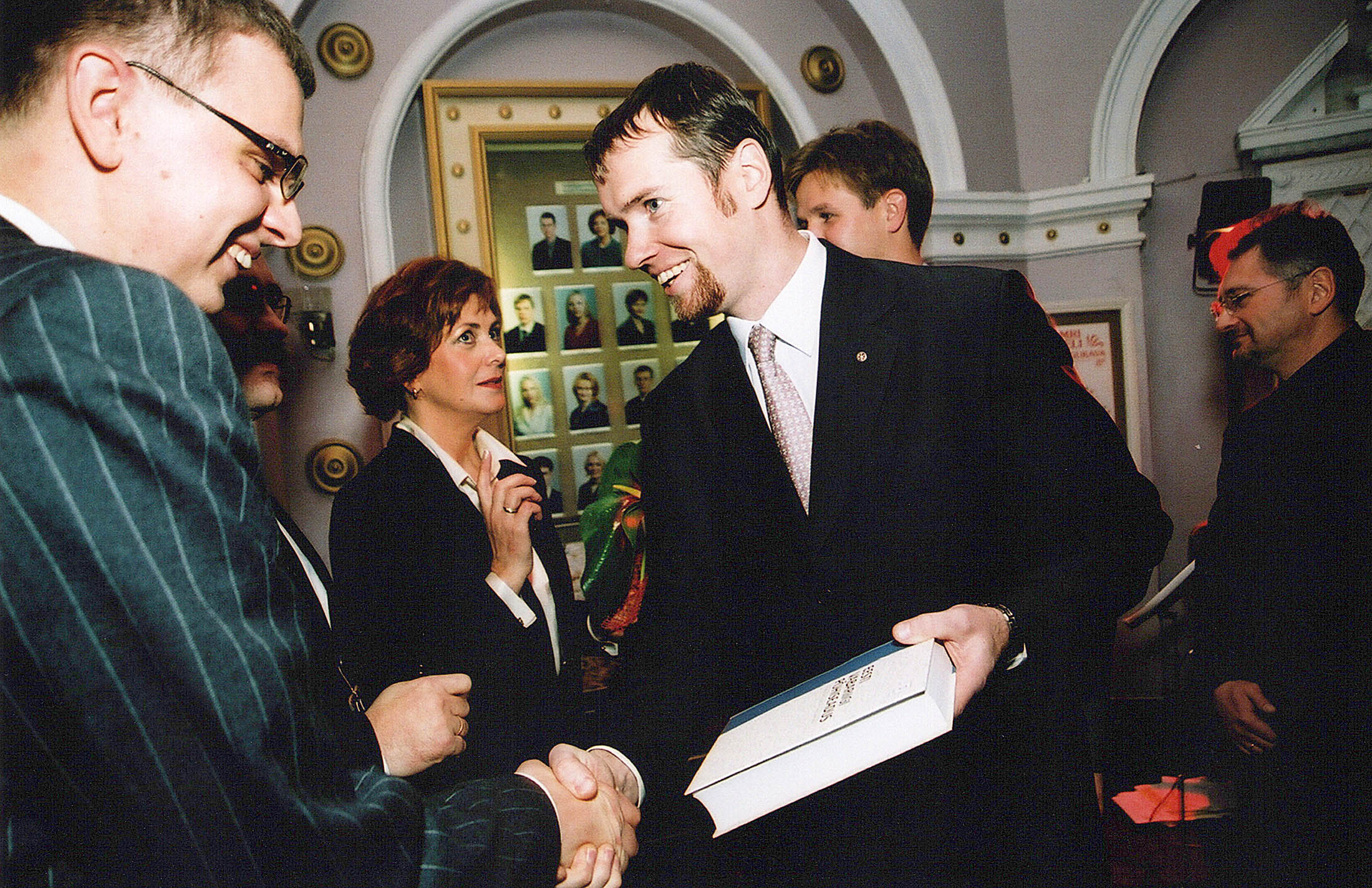Business – it’s about relationships
You cannot have a successful business without good relationships, especially in the services business. It is no secret that people don’t act rationally all the time, so emotions play a part in choosing a partner.
At Rimess, this was understood from day one. Mati Nõmmiste says that client focus – being helpful, friendly and cooperative – was something they wanted to have from the very beginning, even though the deeper meaning of the concept was not understood three decades ago. The principle that good service is rooted in the right attitude, which is to say a desire to serve clients in a pleasant and professional manner, was also valid. The slogan ‘Attitude is everything!’ was used for good reason at Rimess for a long time.
Service starts with a person’s attitude and mindset, as underlined by the slogan ‘Attitude is everything!’, which was introduced in Rimess in 2005 and used for years thereafter, illustrated by a picture of a fish eating a cat – there are no impossible tasks, even if you are small.
Kristjan Järve, who joined Rimess as a tax adviser in 1999, remembers that it was a time when the standard of client service was not written down in detail as it is today, but the employees of Rimess were guided by the feeling that client communication had to be personalised.
“We took the needs of clients into account, even though it may not have been the most efficient way of going about things for us as a service provider,” he recalls. “It would’ve been easier to take a ‘ready-made’ package from the shelf, but that way the client wouldn’t have obtained the most suitable solution, so we didn’t go down that route. Our personalised approach has always required a higher level of commitment from partners and project managers, but that’s what helps us develop and strengthen our client relationships.”
Indeed, the trump card of Rimess and later Grant Thornton Baltic has always been the organisation’s ability to respond quickly to the needs and concerns of its clients. This is possible because the firm is run by local partners and decision-making doesn’t have to be delegated to others, somewhere far away down a complex chain of command. Nor is it unusual on the market for partners to be involved in client projects in addition to the advisers and other specialists who interact most frequently with clients.
An adviser must understand their client’s business
Erkki Torn
CEO and Chairman of the Management Board of MyFitness Group
MyFitness started up in 2008, and since 2009 Mati Nõmmiste and Grant Thornton have been our auditors. A little later, when we expanded into Latvia and Lithuania, Grant Thornton Baltic advised us on the new markets. The support of advisors is essential on a journey like this, and having a reliable, long-term partner makes the process quicker and easier. We’ve grown rapidly in all three Baltic States, and the specialists at Grant Thornton Baltic have always been there to advise us.
It’s important to me that both the auditors and business advisors of Grant Thornton Baltic understand our ambitions and the specific nature of our business – that’s the only way you can give sound advice. For example, we’ve streamlined our internal processes and harmonised our accounting and internal rules across the Baltic region.
What’s the secret of success of Grant Thornton Baltic? I think it’s that they know their clients and their needs. That, in turn, requires competent staff, open communication and good management – all of which Grant Thornton Baltic has!
Clients like it. Similar keywords emerge from decades of client surveys: service is seen as personal, professional and pleasant, and keeping promises, adhering to deadlines and smooth communication are also appreciated. Most importantly, satisfied clients tell others about their experience: most new clients have knocked on the company’s door because of a recommendation. The number of clients who have chosen Rimess as their service provider and remained loyal to the company for decades is also significant.
Many of Rimess’ client relationships have lasted for more than a couple of decades. One of these long-standing clients is entrepreneur Marti Hääl, pictured congratulating Artur Suits at Rimess’ 10th anniversary party.
One of them is AS Alexela, whose first auditor’s report in 1995 was prepared by the auditors of Rimess. Marti Hääl, CEO of the Alexela Group, remembers that a mutual understanding was quickly established. “For business owners, an auditor is like a family doctor – you don’t want to change them if everything is working,” he says. “Our cooperation with Mati Nõmmiste went well, so in the following years we brought the other companies in our group to Mati too.” Such is the journey along the path of growth that the companies have been on together.
According to Hääl, Grant Thornton Baltic is characterised by its professionalism: never cutting corners, be it in auditing, tax advisory or any other service. “They can always be quickly contacted and they’re always constructive,” he adds. “After all, there are no unsolvable problems, just incapable people!”
There is another aspect which is important to him as well: “During an audit, the auditor educates and teaches the client, not the other way around,” he explains. “I don’t mean introducing the tax rules or other requirements that are set out in law, but that the auditor has to understand the client’s business, otherwise they can’t audit it. If you understand how the business works, you can give good advice.” In addition to professionalism and good rapport, he says, this is another significant reason why Alexela and Grant Thornton Baltic have been working together for years.
In 2012, the firm’s 20th anniversary was celebrated at the Seaplane Harbour with 700 guests, including clients, employees and partners from Grant Thornton member companies.
Raul Koni, who was one of the partners at Rimess from 2004-2015, and later at Grant Thornton Baltic, also emphasises the importance of the rapport between the client and the service provider. He recalls a time when a local government that would go on to become a long-term client was offered a two-year audit contract. “Their financial manager told me: “You know what, Koni, let’s start with a one-year contract, then if we’re a good match we’ll do a two-year contract as well”,” he recalls. “So we signed a one-year contract, then a two-year one, and then several contracts in a row!”




